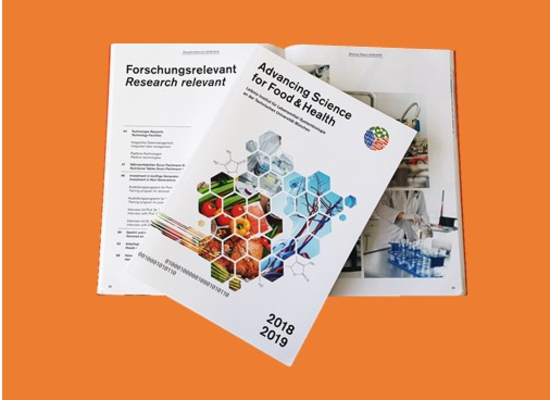Now published: Research Report 'Advancing Science for Food & Health'

Biennial report of the Leibniz Institute for Food Systems Biology at the Technical University of Munich
With this bilingual report (German/English) we not only provide exciting insights into our science and research, but also report on important events in 2018 and 2019.
The 88-page report is now available for downloading from our website https://www.leibniz-lsb.de/en/press-public-relations/annual-report-brochures/.
We would like to thank everyone who contributed to making these two very eventful years so successful for us and hope you enjoy reading it.
Dr. Gisela Olias
Knowledge transfer, Press & Public Relations
Leibniz-LSB@TUM
Phone: +49 8161 71-2980
Email: g.olias.leibniz-lsb(at)tum.de
www.leibniz-lsb.de
Information about the Leibniz Institute
The Leibniz Institute for Food Systems Biology at the Technical University of Munich (Leibniz-LSB@TUM) has a unique research profile. Its researchers combine methods of basic biomolecular research with analytical methods of bioinformatics and analytical high-performance technologies. Their goal is to decode the complex ingredient profiles from raw materials to the final food products and to elucidate their function as biological active molecules on humans. Based on their studies, the scientists develop products, which are as healthy as they are tasty. These foods will help to provide a sustainable and sufficient stream of food for future generations. In addition, the new scientific findings will be used to develop personalized nutritional concepts that, for example, help people with food intolerance without compromising quality of life and endangering their health.
The Leibniz LSB@TUM is a member of the Leibniz Association, which connects 96 independent research institutions. Their orientation ranges from the natural sciences, engineering and environmental sciences through economics, spatial and social sciences to the humanities. Leibniz Institutes devote themselves to social, economic and ecological issues. They conduct knowledge-oriented and application-oriented research, also in the overlapping Leibniz research networks, are or maintain scientific infrastructures and offer research-based services. The Leibniz Association focuses on knowledge transfer, especially with the Leibniz Research Museums. It advises and informs politics, science, business and the public. Leibniz institutions maintain close cooperation with universities - among others, in the form of the Leibniz Science Campuses, industry and other partners in Germany and abroad. They are subject to a transparent and independent review process. Due to their national significance, the federal government and the federal states jointly fund the institutes of the Leibniz Association. The Leibniz Institutes employ around 20,000 people, including 10,000 scientists. The entire budget of all the institutes is more than 1.9 billion euros.
+++ Via our Twitter channel https://twitter.com/LeibnizLSB you stay up to date +++
